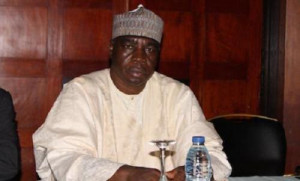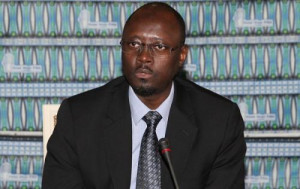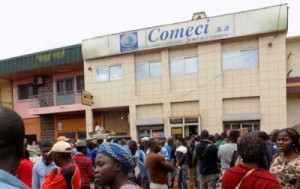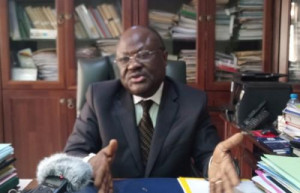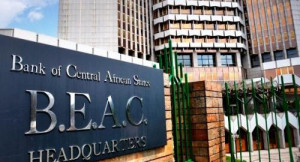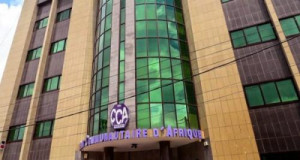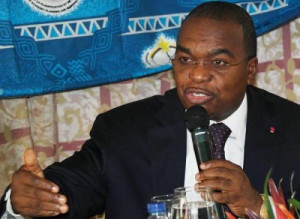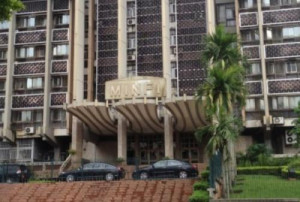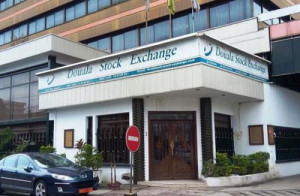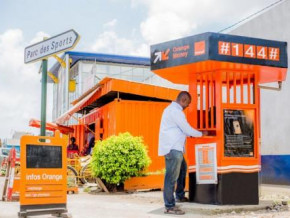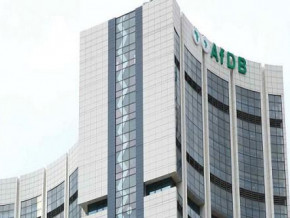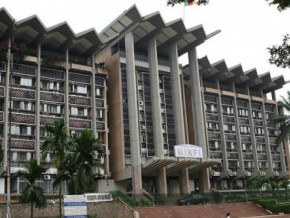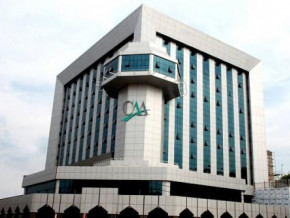
Cameroon: 2018 Corporate tax payment’s deadline extended to Aug 15, 2019
A 5-month extension has just been granted to large firms operating in Cameroon for the payment of their 2018 taxes, a communique signed by assistant minister of finance Yaouba Abdoulaye (photo) indicates. According to the document, the deadline is now August 15.
Initially, the ministry of finance set the deadline for March 15, 2019, and invited the corresponding taxpayers to meet the deadlines so that they can avoid sanctions for payment failure.
For the time being, the deadline of June 30 for the electronic transmission of 2019 tax/statistics statements has not changed.
Let’s note that via the tax dematerialization process, the tax administration wants to exceed the XAF2,200 billion of tax revenues raised during the 2018 fiscal year.
S.A
BEAC caps electronic payments and withdrawals outside CEMAC
On June 10, 2019, the Bank of Central African States (BEAC) published a document that identifies the conditions for using the CEMAC’s electronic payment methods outside the region.
“The use of electronic payment methods outside CEMAC is limited to current transactions that are within the currency allocation threshold prescribed by exchange control legislation,” the document signed by the bank’s governor Abbas Mahamat Tolli (photo) indicates.
Physical Payment or withdrawals using systems outside the CEMAC are capped at XAF5 million per user for every trip. Above this level, the traveller will have to justify the reason such an amount is being requested.
For online transactions, the cap is XAF1 million per user every month or the transaction should be justified via any traceable means within 30 days.
Issuing banks, commercial notably, are called to ensure compliance with these new rules.
Internal sources reveal that the new measures are aimed at fighting money laundering, terrorism and informal trade that led to an erosion of about 50% of SubSaharan countries’ GDP. It is also worth noting that the rules are published in a context marked by a shortage of currencies in the sub-region; a situation regularly reported by employer organizations.
PcA
Cameroon : Microfinance institution Comeci lost XAF8.2 bln in 2017
Compagnie équatoriale pour l’épargne et l’investissement (Comeci) just published a minute of its general assembly. This minute indicates that the Douala-headquartered microfinance institution lost XAF8.281 billion, eight times its social capital, during the 2017 fiscal year.
This huge loss is due to the failure of forced debt recovery. In a bid to save the institution, the interim administrator has been authorized to increase its capital by raising XAF3 billion in sequence according to the situation and Comeci’s needs.
Because of the difficulties experienced by Comeci since 2016, on January 16, 2018, the Central African region’s banking commission COBAC decided to place it under provisional administration. Bernard Mvogo was then appointed as the interim administrator for a 6-month mandate. It seems that things have not changed.
S.A
Cameroon to raise XAF350 bln in the security market this year (Revised financial act)
Instead OF the XAF260 billion prescribed by the 2019 finance law, Cameroon’s public treasury will issue XAF350 billion in public securities. According to Sylvester Moh (photo), director of the directorate of treasury at the ministry of finance, this final volume was decided by the head of state in the revised budget of May 29, 2019. This revised act increases the country’s 2019 budget by XAF361.5 billion.
The official also reveals that the country is preparing to raise at least XAF100 billion during Q3, 2019. For that purpose, it could once again turn to BEAC’s financial market where it raised XAF174 billion with three fungible bond issuances issued within two months.
The public treasury can also raise the funds on the unified Central African stock exchange that will replace the Douala Stock Exchange (Dsx) in July 2019, according to official sources.
Critics
The country has been criticized by the IMF for its propensity to have recourse to non-concessional loans instead of the concessional provided by multilateral investors. Indeed, the volume of public securities prescribed in the revised finance act averages the XAF300 billion- XAF350 billion in that market for the past three years.
The Bretton Woods institution notably fears a new rapid growth of Cameroon’s debt after the 2006 episode that led the country into the Heavily Indebted Poor Countries (HIPC) Initiative for the remission of its foreign debt.
In reply to the IMF’s worries, Cameroon indicates that its debt (35% of GDP) is still sustainable since the volume of its culminated debts is largely below the 70% of GDP set in the convergence criterion within CEMAC.
At the same time, Cameroonian public institutions explain their preference for the security market by its flexibility (unlike the conditions set by international backers for their loans) in terms of disbursement and use of received funds.
Brice R. Mbodiam
Cameroon: Property tax payment deadline set to Jun 30, 2019
The payment deadline for the 2019 property tax in Cameroon is June 30, 2019, finance minister Louis Paul Motaze announces. According to the official, pre-filled statements are currently being distributed around the country.
The ministry of finance indicates that tax incentives are offered for payment via mobile phone. Taxpayers who wish to pay at tax offices can visit the nearest centers.
Let’s note that this year, the tax office suspended its project of combining property tax with electricity bills as it was indicated in the 2019 finance act.
Officially, combining property tax with the electricity bill would have helped double the current volume tax revenues generate (XAF5 billion).
S.A
Cameroon’s fungible bond issuances of May-Jun, 2019 oversubscribed
During the fungible bond issuance operations of May 22, May 29 and June 12, 2019, Cameroon raised XAF174 billion while its target was XAF150 billion.
According to the general directorate of the treasury at the ministry of finance, this success indicates investors’ trust in Cameroonian bonds.
The same source indicates that the surplus will be invested in new public projects. Authorized sources reveal that XAF6 billion could be used to refinance Camair-Co, the public airline company.
BRM
Cameroon: CCA Bank ends 12th operating month with 20% increase in deposits
Cameroonian microfinance institution Crédit communautaire d’Afrique (CCA), which became CCA Bank in May 2018 recorded a 20% increase in its deposits at end May 2019. This was revealed by Défis Actuels, which quoted an official release published by the new bank.
From more than XAF174.3 billion in May 2918, those deposits rose to XAF209.3 billion at end May 2019. The same development is observed in the credit segment. Those credits rose by 35% during the period under review to reach X107.3 billion.
“Though the number of ATMs and agencies has not changed, it is worth noting that despite its huge performance in financing the economy, CCA-Bank ended its 12th operation year with an impressive excess of liquidity and a credit-deposit ratio of 51% on May 31, 2019,” the bank indicates.
BRM
Cameroon: There is a need for a single budget unit dedicated to Planut and AFCON projects (Finance ministry)
Cameroon needs to create a single budget unit dedicated to monitoring and evaluation projects in the framework of the Planut and the AFCON. This is the solution suggested by the ministry of finance in its report of the 2018 budget execution.
In the report, the ministry indicated that there were monitoring and evaluation problems for two types of expenses during the period under review. The first type was related to the execution of projects under the 3-year urgency plan to boost economic growth (Planut), adopted by Cameroon in December 2014, with a budget of XAF925 billion. The second type of expense was for projects in the framework of the AFCON. According to the report, XAF72.1 billion was spent in 2018 for AFCON projects.
Because of the numerous institutions in charge of the implementation of projects that fall in the framework of these projects, there was a coordination problem. This affects the budget since they generate an important volume of debts that "require important budgetary provision."
Therefore, the creation of that single budget unit can allow better monitoring of the projects.
Sylvain Andzongo
Cameroon praises investors’ trust and attraction to its bonds in 2018
In 2018, Cameroon issued XAF302 billion in Treasury securities, a budget execution report indicates. Compared with the XAF260 billion planned in the budget, this represents a 116.2% achievement rate.
As far as treasury bills are concerned, the value of the issuance is XAF102 billion and XAF185 billion for refunds. In 2017, the net value of treasury bills issued was XAF85 billion, a performance which is 20.0% below the 2018 figure.
Bonds issuances were launched around the end of the fiscal year. The amount raised is XAF204.3 billion (XAF54.3 billion above the target) at a net interest rate of 5.6%. These bonds have a maturity period of five years, with quarterly payments after a year delay.
According to the finance ministry, which published the budget execution report, the over-subscription for Cameroon’s bond issuance is proof that these bonds are attractive and trusted by investors.
Sylvain Andzongo
CEMAC: The unified exchange will be officially launched on Jul 5, 2019, in Douala
The launch of CEMAC zone’s unified exchange is planned for July 2019. This was announced by Nagoum Yamassoum, president of the COSUMAF, Central African financial markets’ supervisory comitee, on June 13, 2019, in N’Djamena (Chad).
During a workshop to sensitize players of the N’Djamena exchange on the regional exchange, Nagoum Yamassoum indicated that the extraodinary general meetings of Gabonese exchange Bourse des valeurs mobilières de l’Afrique centrale (Bvmac) and Cameroon’s Douala Stock Exchange (DSX) would be held on July 1, 2019 to validate the unification agreement. He also revealed that the proposed date for the effective launch of this unified exchange is July 5, 2019, in Douala.
According to Nagoum Yamassoum, in H2, 2019, various institutions of this exchange will be restructured to provide them with the necessary operational capabilities for the effective take-off of this regional market.
Let’s note that the unification of CEMAC’s financial markets was approved by the conference of the region’s Heads of States during its extraordinary meeting of October 31, 2017. The conference decided that the regulator COSUMAF would be based in Libreville (Gabon) while the exchange would be located in Douala (Cameroon). Temporarily, the Bank of Central African States BEAC is to be the central custodian.
S.A
Mags frontpage
- Most read 7 days
- shared 1 month
- read 1 month


